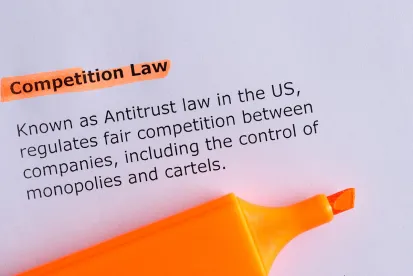United States
A. Federal Trade Commission (FTC)
1. FTC updates standard notice for merger-review process.
On Aug. 3, 2021, the FTC announced it was adjusting its merger review process to provide for the sending of standard form letters alerting companies that an FTC investigation remains open and that, upon expiration of the statutory review period (which in most deals is 30 calendar days), companies that close on their transactions do so at their own risk. When sent, the letters will remind companies that the FTC may subsequently determine that their deal is unlawful and that the FTC may seek to undo the transaction.
2. FTC announces that payoff-of-debt will no longer be excluded as a form of consideration under Hart-Scott-Rodino rule.
On Aug. 26, 2021, the FTC’s Bureau of Competition announced it was abandoning past interpretations under the Hart-Scott-Rodino (HSR) rules that excluded the payoff of debt by a seller as consideration in determining whether the HSR size-of-transaction test (which currently is $92 million) is satisfied. The change, a departure from long-term practice that was incorporated into many formal and informal interpretations issued by the FTC, has been perceived by some practitioners as another effort by the Commission, under the new leadership of Chairwoman Lina Khan, to discourage the “merger wave” that she has publicly criticized. The Commission stated that “[e]ffective September 27, 2021, the Bureau will begin to recommend enforcement action for companies that fail to file when retirement of debt is part of the consideration for the deal.” In addition, the Bureau warned that practitioners should not rely upon published informal interpretations issued by the Bureau’s Premerger Notification Office in making determinations whether transactions are reportable under the HSR statute and rules.
B. Department of Justice (DOJ)
On Aug. 6, 2021, the DOJ’s Antitrust Division announced that Yama Marifat pleaded guilty to conspiring with other real estate investors to rig bids when purchasing selected properties at foreclosure auctions in San Joaquin, California beginning in April 2009 and continuing until October 2009. According to the indictment, Marifat and his co-conspirators agreed not to bid against each other on selected properties, and instead designated one co-conspirator to bid at the public auction and then held a second, private auction and made payoffs to one another. This was the eleventh individual to plead guilty in the investigation of fraud and bid-rigging of real estate auctions in San Joaquin County. Across the country, the Antitrust Division’s prosecution of bid-rigging in real estate foreclosure auctions has resulted in charges against 140 individuals, including 124 guilty pleas and 12 individuals convicted at trial.
C. U.S. Litigation
1. Animal Science Products Inc et al v Hebei Welcome Pharmaceutical Co et al., No. 13-4791, 2021 WL 3502632 (2d Cir. Aug. 10, 2021).
On Aug. 10, 2021, Chinese Vitamin C manufacturers facing price-fixing claims succeeded in overturning a $147 million jury verdict for a second time, when a federal appeals court in Manhattan again found the alleged cartel scheme was justified by Chinese law. The U.S. Court of Appeals for the Second Circuit ruled for Hebei Welcome Pharmaceutical Co. and parent North China Pharmaceutical Group Corp., lifting the antitrust judgment over “international comity” concerns after the U.S. Supreme Court tentatively reinstated the award in 2018. The Supreme Court had ordered a second look, saying federal courts owed only “respectful consideration” to foreign governments’ interpretations of their own laws. The Second Circuit, however, dismissed the 16-1/2-year-old case because of a “true conflict” between Chinese and U.S. antitrust laws, and the potential impact on foreign relations, holding that despite the U.S. interest in punishing foreign companies’ anticompetitive conduct, the government could address its concerns with China through diplomacy and trade talks. “While the stakes are high for both countries,” the court wrote, “the United States’ concern with extraterritorial enforcement of a private civil judgment under its antitrust laws is substantially diminished in these circumstances.”
2. Fusion Elite All Stars v. Varsity Brands, LLC, No. 2:20-cv-026000 (W.D. Tenn. Aug. 26, 2021).
Bain Capital LP subsidiary Varsity Brands LLC must face antitrust litigation over its alleged scheme to dominate “All Star Cheer,” the leading form of standalone competitive cheerleading, by conspiring with a standards-setting organization it controls, a federal judge in Tennessee ruled.
The judge allowed the proposed class action to move forward in the U.S. District Court for the Western District of Tennessee. According to the court, plaintiffs adequately alleged a pattern of acquiring market share and then raising prices. The court also observed that because the case is highly fact-intensive and not suitable for a motion to dismiss, defendant would get its chance to prove that its alleged monopoly was the result of superior products and reputation. The court also rejected defendant’s attack on the alleged product and nationwide geographic markets, stating that the complaint properly alleges a unique nationwide market with no reasonable substitutes.
3. In re Juul Labs Inc Antitrust Litigation, No. 3:20-cv-02345 (N.D. Cal. Aug. 19, 2021).
On Aug. 19, 2021, a federal judge allowed most claims to go forward in antitrust litigation by e-cigarette purchasers accusing Juul Labs Inc. and Altria Group Inc. of working together to suppress competition in the e-cigarette market. The judge ruled that the plaintiffs—representing proposed classes of direct purchasers, individual indirect purchasers and reseller indirect purchasers—had successfully alleged that they had been harmed by anticompetitive conduct related to Altria’s 2018 acquisition of a 35% stake in Juul. In addition, Juul Labs Inc. won its bid to arbitrate rather than litigate the claims of three named direct purchasers who brought a proposed class action seeking to unwind a $12.8 billion deal with Altria Group Inc. that gave Altria a stake in Juul’s products and technology. The direct purchasers—individuals who bought Juul e-cigarette devices directly from the company—waived their right to pursue class claims in court when they created online accounts with Juul, according to the judge. He found that the three named direct purchaser plaintiffs had agreed to arbitration when they bought from Juul’s website, and so they could not represent the class. However, citing a ruling he had made earlier in the case, the judge said plaintiffs who made their purchases before Aug. 9, 2018, when Juul changed its website to make the arbitration agreement more prominent, were not bound to arbitrate, and he gave the plaintiffs 30 days to substitute suitable class representatives.
4. Top Agent Network, Inc. v. National Association of Realtors, et al., Case No. 3:20-cv-03198, 2021 WL 3616480 (N.D. Cal. Aug. 16, 2021).
The National Association of Realtors (NAR) sidestepped antitrust litigation in a federal court in San Francisco over its policy requiring brokers to list properties on its databases within a day of marketing the “pocket listings” elsewhere. The NAR Clear Cooperation Policy requires brokers to submit listings to a multiple listing service within a day of marketing a property to the public, preventing them from publicizing listings without making them available to other agents.
The judge threw the case out of the U.S. District Court for the Northern District of California, about four months after initially dismissing it in a tentative ruling that authorized an amended complaint by the plaintiff, boutique listings service Top Agent Network Inc. (TAN). The judge ruled that although TAN made a “reasonable” argument that the Clear Cooperation Policy was anticompetitive, it was in fact TAN that would run on an anticompetitive business model if the challenge succeeded. “The Policy leverages NAR’s control of the real estate market to coerce most agents into giving up their off-MLS activities entirely, without regard to the competitive value of those activities,” the court concluded, while noting that TAN’s model, which lets agents conceal listings from NAR’s subscribers while benefiting from NAR’s multiple listing service, undermined its case. TAN agents can use information from NAR to make their public and exclusive listings more competitive, while agents who are not members of TAN do not have access to that kind of intel. Then, when sellers list homes with TAN agents without listing it on the MLS, competition for that home decreases, the judge said. Thus, TAN was the wrong plaintiff to bring an antitrust suit over the policy, he said, as plaintiffs cannot use antitrust law to shield their own anticompetitive activities.
Mexico
A. Competition authority presents allegations against dominant player in fuels market.
The Comisión Federal de Competencia Económica (COFECE)—the competition authority in Mexico— announced on Aug. 17, 2021, that it has enough evidence to believe that a company with a dominant position in the selling, storage, and transport of fuels has engaged in discriminatory pricing activities that could affect the Mexican markets. COFECE did not disclose the name of the company but clarified that the company will have the opportunity to present a defense against the allegations before the Commissioners.
B. Five pharmaceutical companies fined for cartel conduct.
On Aug. 16, 2021, COFECE fined five companies and 21 individuals with 903.4 million pesos (US $46 million) for cartel conduct (price-fixing and restricting supply) in the drug distribution market. In addition, the Association of Distributors of Pharmaceutical Products of the Mexican Republic (Diprofar) was also fined for assisting in the conduct. According to COFECE, the collusive practice took place over a period of 10 years (from June 2006 to the end of December 2016).
Co-authored by Edoardo Gambaro, Pamela J. Marple, Yuji Ogiwara, Stephen M. Pepper, Gillian Sproul, Hans Urlus , Dawn (Dan) Zhang, Mari Arakawa, Filip Drgas , Marta Kownacka, Pietro Missanelli, Massimiliano Pizzonia, Anna Rajchert, Jose Abel Rivera-Pedroza, Ippei Suzuki, Rebecca Tracy Rotem, Chazz Sutherland, John Gao.







 />i
/>i
